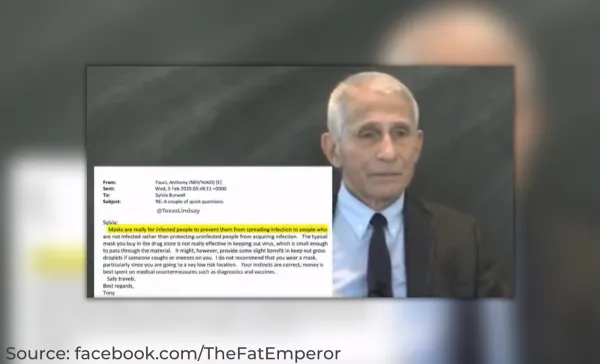By: Rahul Adhikari
April 17 2023

Dr. Anthony Fauci's advice to Sylvia Burwell on masks has been shared with false claims. Fauci revised his statement after CDC guidelines.
Context
A video making rounds on social media claims that Dr. Anthony Fauci, the former director of the U.S. National Institute of Allergy and Infectious Diseases, was caught giving contradictory advice about wearing masks. In the video, which seems to be a hearing, Fauci is asked about sending an email to American University President Sylvia Burwell. An unseen speaker, explains that Burwell asked Fauci, via email, whether she should wear a mask in the airport in the early stage of the pandemic. A screenshot of an email that Fauci composed on February 5, 2020, is also featured in the video. A part of the email read, "Masks are really for infected people to prevent them from spreading the infection to people who are not infected, rather than protecting uninfected people from acquiring an infection." The viral video has garnered 3,300 views and 223 likes. The caption of the post read, "Fauci the Fraud caught red-handed!"
However, although Fauci recommended that individuals should not wear masks in the early phase of the pandemic, he revised his advice and urged people to wear masks to control the spread of the virus shortly after.
In Fact
In June 2021, news outlets such as CNN, The Washington Post, and Buzzfeed News obtained 866 pages of Fauci's emails through a Freedom of Information Act request. These emails displayed Fauci's thoughts on a variety of issues ranging from the origin of COVID-19 to his feelings about masks. Following the publication of these emails, Fauci faced criticism on social media for allegedly providing misleading information regarding COVID-19. However, the email in question was written before COVID-19 was declared a pandemic and matched Fauci's advice to the public at the time.
On March 9, 2020, Fauci stated that "there's no reason to be walking around with a mask" during an interview with '60 Minutes'. He said he was concerned about the shortage of masks for the healthcare workers, the people who really needed them. However, after WHO declared COVID-19 a pandemic on March 11, the US Centers for Disease Control and Prevention (CDC) published guidelines urging people to wear masks to curb the spread of the virus. Following this, Fauci revised his statement and advised people to wear masks.
In an interview with The Washington Post, on July 24, 2020, Fauci explained how his position on masks has changed. He said, "We didn't realize the extent of asymptomatic spread…what happened as the weeks and months came by, two things became clear: one, that there wasn't a shortage of masks, we had plenty of masks and coverings that you could put on that's plain cloth…so that took care of that problem. Secondly, we fully realized that there are a lot of people who are asymptomatic who are spreading infection. So it became clear that we absolutely should be wearing masks consistently."
Responding to a question about his February 5, 2020, email to Burwell, Fauci told CNN in June 2021 that if the scientific data for the asymptomatic transmission of the virus and the effectiveness of masks outside of hospitals had been available at the time, his approach would have been different.
The claim made in the video gained significant popularity in 2021 as well and was debunked by fact-checking organizations.
The Verdict
Fauci's initial advice to the public was not to wear masks before COVID-19 was declared a pandemic. The email featured in the viral video was written during the early stages of the outbreak, and Fauci revised his stance on masks after the CDC issued new guidelines and evidence was found about the effectiveness of masks in reducing the spread of the virus. Therefore, we have marked this claim as misleading.
The COVID-19 pandemic has given rise to a lot of potentially dangerous misinformation. For reliable advice on COVID-19, including symptoms, prevention, and available treatment, please refer to the World Health Organization or your national healthcare authority.